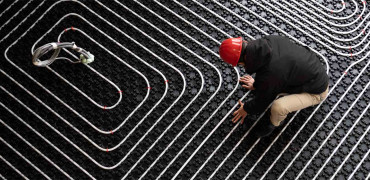I just read a piece in the New Statesman (1 August) under the title ‘22 heat pump myths debunked’ which surprised me, because I thought more people new about the benefits of heat pumps and I couldn’t quite believe that some of these spurious and factually incorrect myths were still doing the rounds.
Then I read George Clarke’s latest powerful article on The Hub, where he leads with the discovery that 7 out of 10 people in the UK say they have never heard of a heat pump, which floored me.
The figure comes from some research my colleagues in Heating will be publishing soon and this got me thinking about whether I’m too close to the industry to properly judge how much information is getting out to the general public?
And when information does get covered in the news, how is it covered?
Who is doing the speaking and the reporting?
And is the information provided always accurate and correct?
I am appalled that opinions rather than facts are still given public airtime
What is the truth?
I listened to Radio 4’s PM programme on my way home from work last Monday and was shocked by an interview with Labour peer Lord Willie Haughey, where he made several claims about heat pumps that are simply not true.
Lord Haughey claimed to have sold thousands of heat pumps but only for the right application, which he saw as air conditioning for heating in the winter and cooling in the summer. He said that it was wrong to call heat pumps an alternative heat source, that they are designed for air conditioning, and that it was disingenuous to say otherwise.
He felt that there was no way that we should move from gas to heat pumps, although he accepted that we do need to stop using gas and proposed direct electric heating instead.
He claimed that heat pumps don’t work in most homes and are not used domestically in Norway as much as we might think.
And he stated that there are many occasions where the home will simply not get the heat needed, and that there were all sorts of problems from installing heat pumps in UK homes. He said that they don’t save you electricity, don’t cost less to run and will not save money.
Lots of myths in that interview
There’s a lot to unpick there but let me deal with the air conditioning point first.
It’s true that elements of modern air conditioning have been used to improve heat pumps over the past 15 years or so, but the fact is that the first recognisable heat pump was built in 1856-57 by Peter von Rittinger, which is almost half a century before Willis Carrier designed the first modern air conditioning system in 1902.
The first heat pump installation in the UK was in Norwich in 1945 and there were several attempts to develop a UK market, especially in the 1980’s, when fixed-speed heat pumps from Scandinavia first made their way here.
Fixed-speed systems work best in very well insulated properties (like they have in Scandinavia – including in Norway!) and the market struggled to develop into more than a niche sector primarily due to the preponderance of leaky, inefficient UK homes.
The birth of the current market happened when the best, inverter-driven elements of modern air conditioning were moved over to heat pumps, but it is disingenuous to say that a heat pump is simply a reconfigured air conditioning unit.
These are different machines designed and engineered for very different purposes.
They don’t save electricity
The next myth that I would challenge is the idea that heat pumps don’t save electricity and it’s far better to use direct electric heating.
Whilst I disagree with his overall premise there, he is right in one respect as heat pumps will not ‘save’ electricity as they need to consume it to run.
But they will work far more efficiently than direct electric heating (or gas) because for every one kilowatt of electricity consumed, you get 3, 4, 5 or more units of heat out of the other end.
This is why heat pumps are given a COP of 3, 4, 5 or more, because they upgrade low temperature heat harvested from the outdoor air.
Direct electric can only have a COP of 1 because 1 kW in = 1 kW out.
In contrast to both, a modern gas boiler can only have a COP of less than 1 (0.93) because it loses some energy in the combustion process – Older boilers will be anything from 0.5 – 0.8 depending on age and service levels.
They don’t work in the UK
Lord Haughey also claimed that heat pumps don’t work in most UK homes and are not used domestically in Norway as much as we might think.
He also stated that there are many occasions where the home will simply not get the heat needed, and that there were all sorts of problems from installing heat pumps in the UK.
As an industry, heat pump manufacturers are estimated to have sold around 300,000+ heat pumps here in the UK over the past decade. The overwhelming majority are working very well indeed, thank you very much and, in the few cases where there are any issues, it is invariably down to the design, installation and implementation – all things that can be fixed – rather than the ‘box’ itself.
And as for not being used much in Norway, tell that to our colleagues over there and their customers who have created a healthy heat pump market right across Scandinavia.
I am appalled that opinions rather than facts are still given public airtime but it also serves as a timely reminder that we shouldn’t assume that everyone knows the benefits or understands the urgent need to move to heat pumps.
As an industry, we still have a lot to do to convince a sceptical public of the need to switch from gas during a cost-of-living crisis.
And this is not helped by factually incorrect reports from people such as Lord Haughey, although even the BBC reporter was pushing back at some of his claims.
Thankfully, the engineers I see coming through our training courses every week understand the importance of helping the public understand the need to transition to heat pumps and, slowly, little by little, we can work together to counter misinformation and correct the heat pump myths.
Ben Bartle-Ross is a Technical Trainer at Mitsubishi Electric




